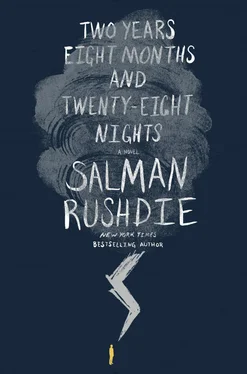When Sister Allbee discovered that her feet were an inch and a half off the ground she was angrier than at any point in her life since her father ran off with a gravel-voiced Louisiana chanteuse the week before he was supposed to take his daughter to the new Disney park in Florida. On that occasion she had gone through the second-floor apartment in the Harlem River Houses destroying all trace of her delinquent parent, tearing up photographs, shredding his hat, and making a bonfire of his abandoned clothes in the play space outside, watched silently by her mother flapping her arms and silently opening and shutting her mouth but making no attempt to dial back her daughter’s rage. After that her father no longer existed and young C. C. Allbee gained a reputation as a girl never to be crossed.
Her favorite tenant, Blue Yasmeen, had taken off too, and was found sobbing uncontrollably in the hallway a full two inches up in the air. “I always defended him,” she wailed. “Whenever you said something against him, I stuck up for the guy, because he was kind of a silver fox and he reminded me of my dad. Then a female on a flying rug shows up and I’m like am I going crazy and now this. I stuck up for the dude. How did I know he would pass his fuckin’ sickness on to me?”
That made two betrayals by father figures to be mad about, and a few minutes later Sister Allbee used her master key to enter Mr. Geronimo’s apartment with a loaded shotgun in her hand, with Blue Yasmeen fretful close behind her. “You’re out of here,” she bellowed. “Walk out by nightfall or be carried out feet first before dawn.”
“He’s standing on the floor!” Blue Yasmeen screamed. “He’s cured, but he’s left us sick.”
Fear changed the fearful, thought Mr. Geronimo looking down the barrel of the gun. Fear was a man running from his shadow. It was a woman wearing headphones and the only sound she could hear in them was her own terror. Fear was a solipsist, a narcissist, blind to everything except itself. Fear was stronger than ethics, stronger than judgment, stronger than responsibility, stronger than civilization. Fear was a bolting animal trampling children underfoot as it fled from itself. Fear was a bigot, a tyrant, a coward, a red mist, a whore. Fear was a bullet pointed at his heart.
“I’m an innocent man,” he said, “but your gun makes an excellent argument.”
“You are the spreader of the plague,” said Sister Allbee. “Patient Zero! Typhoid Mary! Your body should be wrapped in plastic and buried a mile underground so you can’t ruin any more lives.”
Fear had Blue Yasmeen by the throat as well. “My father betrayed me by dying and abandoning me to the world, when he knew how much I needed him. You betrayed me by ripping the world away from beneath my feet. He was my father, so I love him anyway. You? You should just go.”
The fairy princess had disappeared. When she heard the key turning in the lock she had turned sideways and disappeared through a slit in the air. Maybe she would help him, maybe not. He had heard all about the whimsical untrustworthiness of the jinn. Maybe she had just used him to feed her sexual hunger, for it was said that the jinn are insatiable in that department, and now that she was done he would never see her again. She had brought him down to earth and that was his reward, and all the rest, about his own jinn powers, was nonsense. Maybe he was alone, about to be homeless, faced with the unarguable truth of a shotgun in the hands of a woman enraged by her fear.
“I’ll go,” he said.
“One hour,” said Sister.
And in the city of London, far from Mr. Geronimo’s bedroom, a mob had gathered outside the home of the composer Hugo Casterbridge in Well Walk, in the sylvan borough of Hampstead. He was surprised to see it, because he had of late become a laughingstock, and public anger seemed an inappropriate response to his new reputation. It had become conventional to ridicule Casterbridge ever since his ill-advised television appearance in which he threatened the world with plagues sent down upon humanity by a god in whom he did not believe, the classic idiocy of the artist, everyone said, he should have stayed home and tinkled and tootled and clanked and banged and kept his mouth shut. Casterbridge was a man shored up by an immense, solid and hitherto impermeable self-belief but he had been unnerved by the ease with which his previous eminence had been obliterated by what he thought of as the new philistinism. There was apparently no room for the idea that the metaphorical sphere could be so potent that it affected the actual world. So he was a joke now, the atheist who believed in divine retribution.
Very well. He would indeed stay home with his strange Schoenbergian music which few people understood and even fewer enjoyed. He would think about hexachordal inversional combinatoriality and multidimensional set presentations, he would brood on the properties of the referential set, and let the rotting world go hang. He was more and more of a recluse anyway these days. The doorbell of the Well Walk mansion had gone wrong and he saw no need to have it fixed. The Post-Atheist group he had briefly assembled had melted away under the heat of public obloquy but he stuck, silently, angrily, with gritted teeth, to his guns. He was accustomed to being thought incomprehensible. Laugh! he mutely instructed his critics. He would see who had the last laugh of all.
But apparently there was a new preacher in town. There was a wildness in the city, fires on council estates in the poor boroughs to the north, looting of high-street stores in the usually conservative regions south of the river, and mutinous crowds in the main square that didn’t know what to demand. Out of the flames came the turbaned firebrand, a small man with Yosemite Sam saffron beard and eyebrows, wrapped in a strong smell of smoke; he appeared from nowhere one day as if he stepped through a slit in the sky, Yusuf Ifrit was his name, and suddenly he was everywhere, a leader, a spokesman, he was on government committees, there was talk of a knighthood. There is indeed a plague spreading, he thundered, and if we do not defend ourselves against it we will all be infected for sure, it’s infecting us already, the impurity of the disease has touched the blood of many of our weaker children, but we are ready to defend ourselves, we will fight the plague at its roots. The plague had many roots, Yusuf said, it was carried by books, films, dances, paintings, but music was what he feared and hated most, because music slid beneath the thinking mind to seize the heart; and of all music makers, one, the worst of them all, the plague personified as cacophony, evil transmuted into sound. And so here was a police officer visiting the composer Casterbridge, I’m afraid you’ll have to move out, sir, until things cool off, we can’t guarantee your safety at this location, and there are your neighbors to consider, sir, innocent bystanders could be hurt in an affray, and he bridled at that, Let me understand you, he said, let me be perfectly clear what you’re telling me here, what you’re saying to me now is that if I get hurt in this putative affray of yours, if the injury is to me, then I’m not an innocent bystander, is that your fucking point? There’s no need for that kind of language, sir, I won’t stand for it, you need to take on the situation as it is, I won’t endanger my officers by reason of your egotistical intransigence.
Go away, he said. This is my home. This is my castle. I’ll defend myself with cannons and boiling oil.
Is that a threat of violence, sir?
It’s a fucking figure of speech.
Then, a mystery. The gathering mob, words of hate, aggression disguised as defensiveness, the threatening claiming to be under threat, the knife pretending to be in danger of being stabbed, the fist accusing the chin of attacking it, all that was familiar, the loud malevolent hypocrisy of the age. Even the preacher from nowhere wasn’t much of a puzzlement. Such unholy holy men cropped up all the time, created by some form of sociological parthenogenesis, some weird bootstrap operation that made authorities out of nonentities. That was stuff to shrug at. Then on the night of the mystery there were reports of a woman seen with the composer, silhouetted against the living room window, an unknown woman who appeared as if from nowhere and then disappeared, leaving the composer alone at the night window, opening it in defiance of the gathered mob, his painful dissonant music clanging behind him like an alarm system, his arms outstretched as if crucified, what was he doing, was he inviting death into his home, and why was the crowd suddenly hushed, as if some giant invisible cat had got its tongue, why wasn’t it moving, it looked like a waxwork tableau of itself, and where were those clouds coming from, the weather in London was clear and mild, but not in Hampstead, in Hampstead that night all of a sudden there was rolling thunder, and then bolts of lightning, wham, crash, and the mob didn’t wait around for another strike, the lightning broke the spell and the mob ran screaming for its life, down Well Walk and on to the Heath, nobody killed thank goodness, except for the idiot who decided the best place to shelter from thunderbolts was under a tree, he got fried. The next day the mob didn’t come back, or the next, or the next.
Читать дальше












